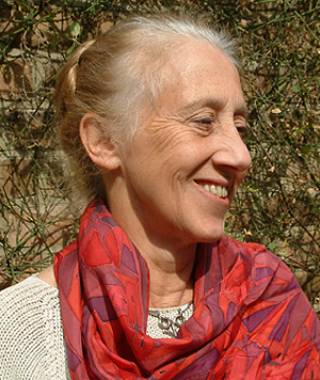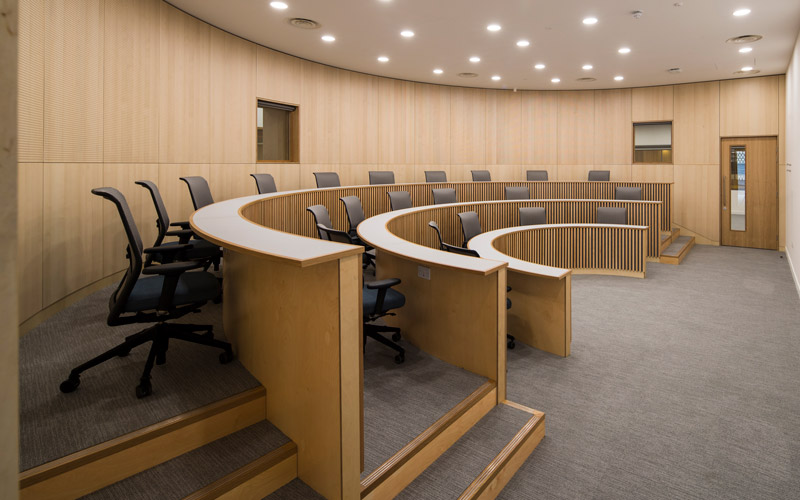Ann Noble Research Award (MSc Healthcare Facilities)
27 May 2020
The Ann Noble Research Award has been established in Ann’s memory and in acknowledgement that her driving passion was excellence in research.

Introduction
Ann Noble was one of the leading figures in healthcare design and research for many years. Among her many achievements, she led a Masters course in health building planning at the now defunct Medical Architecture Research Unit (formerly part of LSBU).
The Ann Noble Research Award has been established in Ann’s memory and in acknowledgement that her driving passion was excellence in research.
The Award is made possible by the generosity of the Noble family – her husband Paul Noble and her two children Sophie and Jake: all three are professionals in the fields of architecture and urban planning.
- Short Biography of Ann Noble
Dr Ann Noble PhD, B Arch, MA Sociology, Dip. Town Planning, RIBA held a significant presence in healthcare design and research for over 40 years. She graduated from the universities of Bristol (B Arch) and Essex (MA Sociology) and almost immediately began her lifelong interest in the sociology of healthcare with the Ministry of Housing in Libya as an architect/sociologist.
From 1971-75, Ann conducted research for the UK Department of Health and Social Security (DHSS) Hospital Building Programme in London. At that time and until the late 1980s, the DHSS R+D section was heralded as the world leader in healthcare design, with many nations adopting its standards and guidance.
Appointed to the Medical Architecture Research Unit (MARU) initially as Senior and then Principal Research Officer in 1976, Ann continued research interests in evaluation techniques for health buildings, briefing for acute departments (wards and OPD) among others while teaching the Masters course in planning buildings for health.
Whilst at MARU, Ann established an advisory and facilitating service for General Practice (GP) Premises, and other primary care building developments - the Inner London Practice Premises Unit (ILPPU) - becoming its first Director.
Ann was awarded her PhD by the University of Bristol in 1988 with a thesis focused on detailed in-use analysis of hospital wards and outpatient departments in several English hospitals including the development of an evaluation tool for ward design.
In 1989, Ann left MARU to set up her own practice – Ann Noble Architects - which went on to advise and work with some of the leading major practices in the UK involved with healthcare facilities design and construction.
For a number of years, Ann was appointed by the World Health Organisation to provide expert specialist advice and consultancy across the globe. Throughout her distinguished career, Ann also lectured internationally and continued to research and publish. Her CV of research material runs to several pages.
Ann was unfailingly enthusiastic about excellence in healthcare design and believed passionately that thorough understanding comes through careful study and research.
The Award
Students registered and fully participating in the Healthcare Facilities MSc are eligible to make an application for the award.
The award is a cash bursary of up to £1,500 which the successful student must fully utilise in furtherance of their dissertation: the award is to be expended solely for travel and subsistence within the EU (as at 1 December 2019).
Students will submit a dissertation outline proposal to their course tutors and should indicate at that stage whether their submission is to be considered for the award.
Criteria for appropriate dissertation topics are given below.
In submitting a suitable dissertation outline to be considered for the award, students must indicate clearly how the fund will be expended and importantly, describe fully how the travelling award will enhance their field of research
- Award Topics – criteria
The dissertation topic should reflect the research interests of Ann Noble, as well as the expectation that the completed work will be of a high standard.
Ann Noble researched widely during her career but she returned to particular areas of interest: from these, successful dissertation topics may be researched.
More specifically, Ann’s focus was on the sociology of healthcare – the ways in which people use and interact with their healthcare environments, wherever they may be. Applications should include an element of the sociological characteristics of health facilities albeit not necessarily as a major component of the study.
Topic areas:
- Primary and Community Care facilities
- Ward design
- Building systems for healthcare: standardisation and repeatability
- Evaluation and auditing of processes and environments
- Design Guidance/ Health Building Notes/ Health Technical Memoranda
- HAIs/ Control of Infection as impacted by facility design and management
- Innovation - New ways of Delivering Health Services/ New Directions in Health Care Innovation and Change
- Methodologies for disseminating best practice
- Integration of health and social care services
- Interdisciplinary approaches to health facility planning and management
- Visioning the future of health and social care services
There may be opportunities for two or more of the above topic areas to be combined in one research piece e.g. evaluating primary care facilities in use.
 Close
Close




